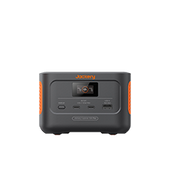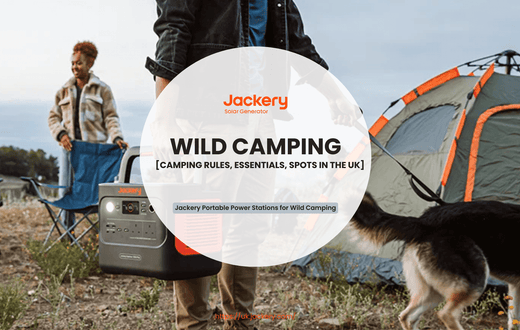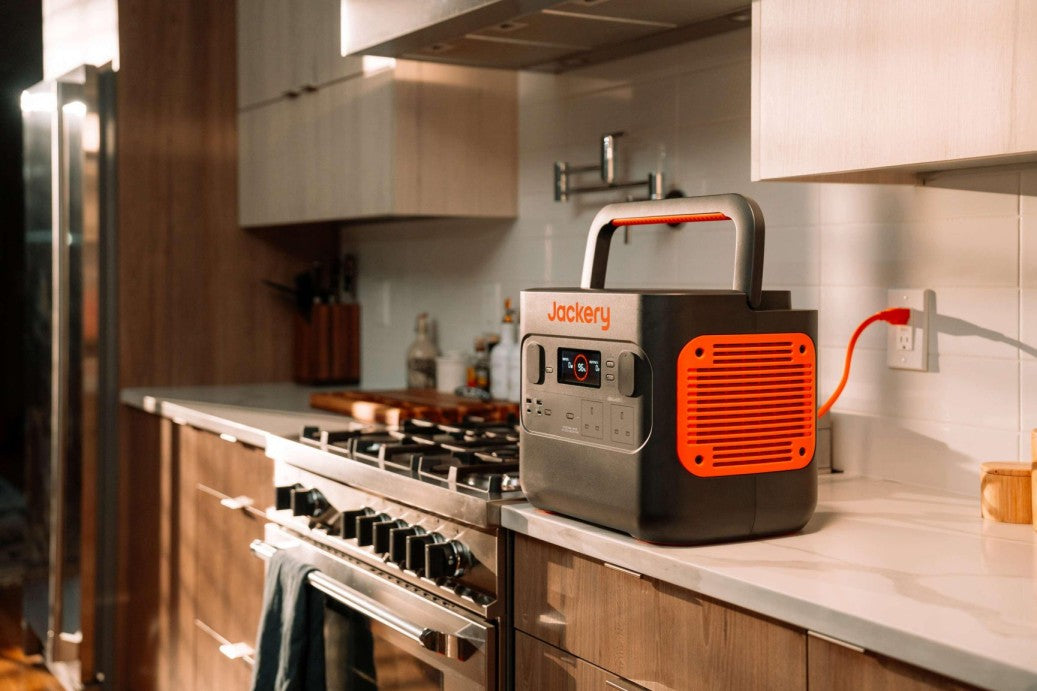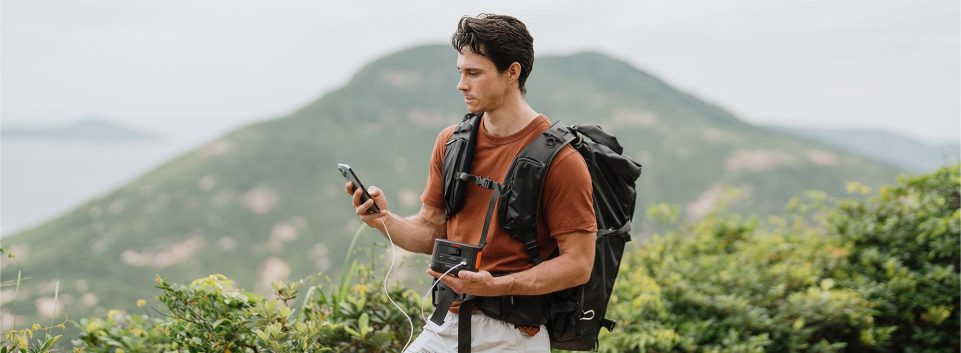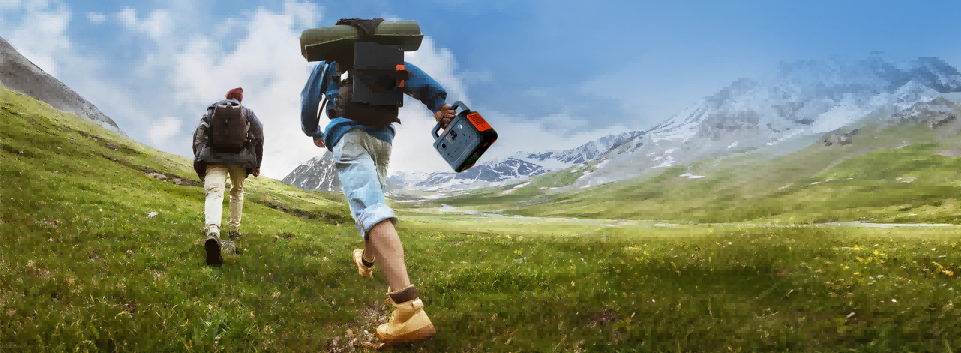Getting away from your busy life and enjoying the peace and simplicity of wild camping can be great for your body and mind. But for those who are new to wild camping, it can be a little daunting.
Do you know what to bring and how to travel light? Do you know where you can go wild camping? What are the rules for wild camping? This guide will cover all aspects of wild camping in the UK, including where you can legally go wild camping in the UK, what wild camping gear is best to bring, and what rules you need to follow when you go wild camping.
Furthermore, electricity is essential in this era, even in wild camping. You need electricity to connect with others, guide your directions, and ensure safety. So, we recommend Jackery Portable Power Station, ranging from 99Wh to 12 kWh, to charge your electronics and devices outdoors in a compact size.
|
Key Takeaways: |
|
- Wild camping is camping in places other than fixed campsites. - In the UK, wild camping is almost only legal in most parts of Scotland. - Finding the perfect wild camping spot requires considering the location, surrounding environment, water supply, and weather changes. - 3 legal camping sites in the UK worth trying: Dartmoor National Park, Cairngorms National Park, and Isle of Skye. - Wild camping in the UK requires following laws and regulations, leaving no trace, protecting water sources, and using fire safely. - We recommend Jackery Explorer 2000 Plus or 1000 v2 portable power station to charge your essentials effectively. |
Wild Camping Overview
In simple terms, wild camping means camping in places that are not fixed campsites. Generally speaking, wild camping refers to camping in remote natural areas. You can go wild camping for one night or several weeks. Originally a military or sports training project, wild camping has become a popular leisure activity.
Wild camping means taking only the necessities with you. You can camp in a small tent or buy a bag for the night and keep the place as it is. In addition, wild camping usually includes activities such as bonfires, barbecues, and picnics, which prevent wild animals from invading and provide campers with ways to keep warm and cook.
Wild camping allows you to explore new areas of the UK and enjoy wide open spaces or cosy hideaways away from the crowds and the hustle and bustle of daily life. In short, wild camping is a good way to get close to nature, relax, and exercise people's survival skills and willpower.
Is Wild Camping Legal in the UK?
Different countries have different rules for wild camping, so it's essential to check the restrictions in your chosen country. Even in countries where wild camping is allowed, you'll still need to research local regulations or guidelines to ensure you're wild camping in a permitted location.
In the UK, most land is privately owned. So, strictly speaking, you'll need permission from the landowner to wild camp, or you may be asked to leave. However, many landowners are happy to host campers.
You could be convicted of trespassing if caught camping in the wild without permission. As this is a civil offence, you're unlikely to be arrested, but you'll be asked to leave. You could be fined if caught camping in the wild without permission multiple times.
The UK's wild camping laws differ in Scotland, with Scotland enjoying free-roaming rules that don't apply elsewhere. Below, we've outlined the general wild camping rules for different parts of the UK.
Wild Camping in Scotland
Beyond that, there are apparent differences in wild camping laws between Scotland and the rest of the UK. The Land Reform Act 2003 gives campers a right to wild camp anywhere in Scotland if they follow the Scottish Outdoor Access Code.
Due to overuse of the land, wild camping is prohibited in Loch Lomond and the Trossachs National Park between March and September unless you buy a camping permit in advance.
Wild Camping in England
Under a July 2023 ruling, campers on Dartmoor no longer need to ask individual landowners for permission before setting up camp. The Lake District National Park Authority generally tolerates campers who follow the "Leave No Trace", although they do not have designated wild camping areas.
Wild Camping in Wales
In Wales, you must ask the landowner for permission before camp. Wild camping is allowed in Erie or near the Welsh Coast Path if you have permission from the landowner.
Wild Camping in Northern Ireland
Going wild camping in Northern Ireland is illegal unless you have permission from the landowner. However, some Forestry Service sites in Northern Ireland allow wild camping if you book or purchase a permit in advance.
How to Find the Best Wild Camping Spot?
Wild camping in the UK is a great way to get close to nature and relax. Finding a perfect spot is a key step to a successful camping trip. Here are some practical tips to help you find your ideal place.

Consider the Location and Surrounding Environment
The location and surrounding environment are crucial when choosing a wild camping site. The UK has many national parks and nature reserves, such as Dartmoor National Park, Lake District National Park, and Pembrokeshire Coast National Park.
In addition, when choosing a wild camping site, avoid dangerous areas, avoid wild animals, and choose a place sheltered from the light and wind near villages and roads.
Dangerous areas usually include under cliffs, under isolated trees, beside rivers, high mountains and valley wind outlets. These places are vulnerable to natural disasters such as falling rocks, lightning strikes, floods and strong winds.
Water Supply
When choosing a wild camping site, try to be close to water sources like rivers and lakes. But don't camp close to the river to prevent the water level from rising at night. Ensure the water source is clean and unpolluted, and bring a water purifier or water purification tablets if necessary.
Pay Attention to Weather and Seasonal Changes
The weather in the UK is changeable, so when choosing a wild camping site, you must consider the local climate conditions. Summer is the best season for wild camping, but you should also consider the weather forecast and avoid choosing areas with frequent extreme weather. For example, choose a higher place to set up camp in rainy seasons to prevent water accumulation or flooding.
In addition, the scenery is very different in different seasons, and you can choose a wild camping site in the corresponding season according to your preferences.
Modern Tools Help
Use camping information platforms to find nearby wild camping sites quickly. Camping information platforms in the UK usually provide detailed maps, camping information and user reviews to help you make a more informed choice. In addition, Google Maps can help you observe the terrain and environment of potential camps in advance, mark possible wild camping spots, and then explore and confirm them on the spot.
3 Best Wild Camping Spots in the UK
From watching the sunset from comfort to walking to seeing the sunrise, wild camping truly immerses you in nature. When finding a wild camping location in the UK, you'll have plenty of options, from the scenic Northumberland to the rolling hills of Scotland. When choosing a camping site, always check its legality. Here are some legal wild camping sites in the UK that are worth checking so you can enjoy the fun of wild camping while following the rules.
1. Dartmoor National Park
For those seeking a wild camping experience, Dartmoor National Park in southwest England is a great choice. Campers can camp at Bellever Forest Campsite or Riverside Caravan and Camping Park. Likewise, Exmoor National Park offers a wide range of camping options, such as Mill Meadow and Exford Country Cottages, where you can enjoy the charm of nature among grasslands, forests and lakes.
While wild camping is allowed in designated areas, campers must follow the rules, protect the environment and keep the area clean.
Location: Southern Devon, South West England (Open with Google Maps)
Contact: +44 1626 832093
Website: Dartmoor National Park
2. Cairngorms National Park
Cairngorms National Park is a must-visit if you are looking for wild camping in the UK. With rolling hills, secluded glens, and peaceful forests, this remote site is perfect for those who want peace and solitude.
However, when camping, please avoid densely populated tourist areas to avoid disturbing people on walking and hiking trails. If you are wild camping in the colder months, please also bring appropriate clothing, as the Cairngorms can be challenging due to their remote location.
Location: Northeast Scotland
Contact: +44 (0) 1479 873 535
Website: Cairngorms National Park
3. Isle of Skye
This wild camping site is renowned for its stunning landscapes, rugged cliffs, and mountains; many people visit it yearly. The sunrises and sunsets from Ben Tianavaig across Portree Firth are also sure to be stunning.
However, like many campsites, the weather on Skye can be unpredictable, so be prepared for all weather conditions, especially in autumn and winter.
Location: On the West Coast of Scotland in the United Kingdom of Great Britain
Web: Isle of Skye
What to Pack for Wild Camping?
Wild camping in the UK is a great way to get close to nature and an incredible journey to explore natural beauty and unique culture. However, what should you bring when wild camping? When considering a wild camping checklist, you must balance carrying the items you need to be safe, warm, and well-fed and keep your backpack light enough. The following is a detailed wild camping checklist.

Don't feel compelled to spend a lot of money on sophisticated wild camping gear; the finest gear is what you already have. As wild campers, we want to have as much fun as possible while reducing our environmental effects. Purchasing new equipment increases the demand for more goods and necessitates using additional resources such as water, wood, and fuel.
|
Wild Camping Essentials Checklist |
||
|
Camping Tent |
Sleeping Bag |
Hammock |
|
Moisture-Proof Mat |
Flashlights |
Portable Stove |
|
Cooking Set |
Kettle |
Water Bag |
|
Wet Wipes |
Waterproof Jacket |
Warm Clothing |
|
Comfortable Shoes |
Hat & Glasses |
Personal Hygiene |
|
Ready-to-Eat Food |
Drinking Water |
Energy Bars |
|
First Aid Kit |
Map or Compass |
Multi-Tools |
|
Trash Bags |
Entertainment Items |
Portable Power |
Before you go, make a camping list of what you need and what you already have. Then, fill in the blanks with what you don't have. When it comes to most things, lighter and more lasting is better. However, these options can be expensive, so pick the best one.
Basic Sleeping Gear
First, you need a "roof" over your head for the night. There are several choices, and each has its pros and cons. Traditional tents are the best way to stay dry, but they can be significant and take a while to set up. You might want to share a tent with a close friend or a lucky man or girl. One of you can carry the poles while the other holds the rest.
A bivvy bag is like an extra waterproof layer for your sleeping bag. They're smaller, cheaper, and lighter than tents, and you can add a layer of security with a tarp. In a bivvy, you'll feel like you're outside but also more exposed, so keep that in mind.
If you want to go camping in the wild, hammocks give you more choices because you can set them up on slopes or rough ground where you can't put a tent. However, you will need trees or friends willing to hold each side taut for the night.
Clothes for Wild Camping
You don't need anything expensive because you're going up a hill, not to the high street, but your wild camping clothes should be able to do a few things.
Heroes don't always wear capes, but they do wear wool from sheep. Merino wool does everything: It wicks away sweat and wetness, keeps your body temperature stable, keeps you warm, lets your skin breathe, and stops smells. It can do more than one thing at once.
Pack extra layers at all times, even outside in the summer. The temperature can drop at night. Always bring one warm layer and one wet layer.
Cooking Equipment for Wild Camping
Eat before you go to keep the weight on your back as low as possible. But if you get hungry on the way, here are our best tips.
Should you use a charcoal stove or liquid gas for cooking? It depends on how often you plan to use them. Canister stoves are cheap and easy to maintain, but liquid gas is more cost-effective in the long run. These stoves are the best for camping and hiking.
You'll also need utensils, bowls, plates, and mugs for cooking in the wild. To save even more space, cook and eat in the same pan. Use a spork to ensure your cutlery doesn't weigh you down.
Portable Power for Wild Camping
With a portable power station (PPS), you can keep your home's electricity running even when the power goes out. You can also use them in your workshops or on building sites. But many people don't know how useful portable power sources are for wild camping in the UK. You can have a better time camping and even have safer outings in the wild with a PPS.
Here, we introduce Jackery Portable Power Station, the portable power supply for charging your essential camping equipment, such as the electric stove, portable grill, communication devices, GPS, and more in wild camping. Learn more about it in the following part.

Jackery Portable Power Stations Explained
The best thing about a portable power station over a regular generator is that it doesn't need fuel or oil to work and doesn't give off harmful fumes. This makes it perfect for adventures like wild camping, where you want clean, quiet power.
A Jackery Portable Power Station is a small, battery-powered gadget that lets you get power on the go. It has AC, DC, and USB ports to run most home and outdoor appliances and smartphones. It's quieter than gas engines, doesn't emit pollution, and can be charged by solar panels, wall outlets, or car chargers.
Jackery Explorer 1000 v2
The Jackery Explorer 1000 v2 will take your wild camping to a new level. It quickly charges your camping essentials, like lights, coolers, and portable stoves. You can also keep your devices charged to capture every unforgettable moment. This way, you can enjoy the great outdoors without sacrificing modern comfort.
With 1007Wh capacity, The Explorer 1000 v2 Portable Power Station has an impressive 1500W output, 50% more than earlier models. It can easily power high-demand items like refrigerators, kettles, and portable air conditioners. With its USB-A/C ports and up to 100W dual PD charging, it can charge two devices (like a phone and a laptop) at the same time, making it the perfect power accessory for any situation.
The Explorer 1000 v2 is certified to IEC 60068 standards and has a high-impact, fire-resistant case that meets and exceeds strict fire-retardant requirements. This ensures that it lasts longer and is safer for worry-free outdoor activities.
Stay in charge with our smart app, which lets you easily track and control how much energy you use right from your phone. This system makes energy control easy and quick because it is intuitive and straightforward.

The following are the working hours of using Jackery Explorer 1000 v2 to charge camping appliances:
|
Camping Appliances |
Working Hours |
|
Coffee Maker (550W) |
1.6H |
|
Camping Lights (50W) |
17.1H |
|
Electric Stove (800W) |
1.1H |
|
Portable Cooler (300W) |
2.9H |
|
Electric Blanket (150W) |
5.7H |
Jackery Explorer 2000 Plus
Jackery Explorer 2000 Plus is more powerful and versatile than 1000 v2. It is a solid portable power solution that delivers outstanding performance for outdoor activities and home backup, including wild camping. With its impressive capacity and powerful output, this device can support the operation of essential appliances for weeks, even certain large appliances.
The Jackery Explorer 2000 Plus enables the addition of extra battery packs, increasing the capacity from 2 kWh to an impressive 12 kWh, thereby significantly satisfying your power needs. This solar product has a remarkable output of 3000W, almost all essential appliances indoors or outdoors.
The Explorer 2000 Plus stands out as a groundbreaking add-on battery pack that offers the convenience of recharging through solar panels, wall outlets or carports. This feature increases versatility, boosts charging efficiency, and shortens charging time.
ChargeShield is Jackery's advanced fast charge technology, featuring 62 protective mechanisms, 12 protective algorithms, and four types of physical safety protection. This technology uses a unique stepped variable-speed charging algorithm to enhance safety and extend battery pack lifespan by 50%.

The following are the working hours of using Jackery Explorer 2000 Plus to charge camping appliances:
|
Camping Appliances |
Working Hours |
|
Coffee Maker (550W) |
3-18.5H |
|
Camping Lights (50W) |
32.7-204H |
|
Electric Stove (800W) |
2-12.75H |
|
Portable Cooler (300W) |
5.4-34H |
|
Electric Blanket (150W) |
10.9-68H |
When to Go Wild Camping in the UK?
You now know what wild camping is and where you might find a good place to stay. But when should you go? We already said it's a good idea to start small. Go somewhere close to home and wild camp for one or two nights. What a difference a small overnighter can make.
Late spring and summer are the best times to camp in the wild, but you can do it any time of the year if you're ready and don't mind getting wet or cold. Some of the best adventures happen in the winter and fall, when it's not as busy.
There is no need to take big chunks of time each year for your camping trip in the woods. You have more time than you think to go on adventures. In 2019, weekends and holidays add up to 116 days, which means you have 116 days to go outside and try an adventure. That's nearly three-quarters of the year before you even took a break.
But if you have some annual leave coming up, add a few extra days to your trip to get the most out of it. You can get much done in one weekend, so make the most of your time.
Wild Camping Tips & Skills
Wild camping is a great way to get close to nature and relax. But in the UK, wild camping is not a free-for-all; it is subject to a series of laws, regulations, and site regulations. Here are some basic rules and precautions for wild camping in the UK to help camping enthusiasts enjoy a safe and enjoyable camping experience.

Tips for Wild Camping in the UK
The following are some practical tips for wild camping in the UK.
Tip 1: Comply with Local Regulations
In the UK, the legal regulations on wild camping differ in different regions. Therefore, please understand and comply with the wild camping site's laws, rules and management regulations in advance, and do not cross the boundary or damage the environment. Most of the UK's land is private, so obtain permission from the owner before wild camping.
Tip 2: No Trace Camping
Please abide by the principle of "leaving no trace" and minimise the impact on the natural environment. Take away all garbage, do not leave garbage in the campsite, and keep the campsite clean and hygienic. Plastic bottles, cans, etc., should be removed from garbage bags. If you cannot remove toilet garbage, ensure it is buried at least 15 cm underground and covered. (Do not bury used toilet paper.)
In addition, to minimise damage to the natural environment, do not hunt and capture wild animals or pick plants at will. Be careful not to damage vegetation, especially at high altitudes, where it is vulnerable to human trampling.
Tip 3: Protect Water Sources
Avoid using soap and chemicals near water sources such as streams and lakes to prevent pollution. In addition, do not go to the toilet within 30 meters of fresh or running water. Drinking water should be prepared by yourself or chosen from a clean water source and boiled for disinfection.
Tip 4: Use Fire Safely
Make fires in designated areas and avoid using bonfires, especially in mountain forests and grasslands. Weeds and dead branches should be cleared around the fire to prevent fires. In addition, bonfires should be kept away from tents and flammable materials, and fire-fighting tools such as water bottles and sand barrels should be prepared.
Skills for Wild Camping in the UK
There's no reason to fear being in nature because you don't think you're good at it, even if you've never set up a tent. We've put together a short list of quick skills you should know before you go wild camping in the UK:
Skill 1: Navigation.
Use what you already have: your phone and Google Maps. You can trust Google Maps to get where you most need to go. They spend a lot of time and money improving them. You can use maps when you're not connected to the internet by downloading your plan beforehand.
You may be unable to charge your phone, so put it on aeroplane mode to save power. Bring a portable power source, like Jackery Portable Power Station, instead. Also, it's wise to bring a current paper map with you.
Skill 2: Flexibility.
As you might expect, camping in the wild is still fun, even when it's raining and windy. It could even be dangerous. If you need to, you should be able to change your mind about your wild camping trip.
Skill 3: Keep Safe in the Wild.
Making sure your trip is safe starts before you leave. Tell someone where you're going and how long you'll be gone. A rough idea will do; you don't have to give an exact grid reference. Prepare for the worst: have a plan B. Make a long list of things to do and check it three times before you leave.
No one wants to get to their chosen location in the middle of nowhere at midnight and realise they forgot their headlamp or toilet paper, but it would make a better story. However, heat is deadly (remember the 33s: three weeks without food, three days without water, and three hours without a place to stay).
If you're wild camping and don't have enough clothes or a place to stay warm, you might be unable to protect yourself from the weather. In any case, this doesn't need to be a problem. Just make sure you check the weather and pack for it.
Skill 4: Find the Clean Water.
Finding clean water is significant when you're out in the woods. Water like that in lakes, ponds, and streams may look very appealing when thirsty. But be careful because these places can be breeding grounds for bacteria that can make you sick. Choose running water, like that in rivers and streams, instead. It tends to be cleaner.
Get water upstream, and look around for dead animals or other trash. No matter where the water comes from, you should always boil it and leave it there for three minutes or add cleaning tablets. Keep in mind that even water that has been sterilised should be filtered to get rid of any germs.
Wild Camping FAQs
The following are the frequently asked questions about wild camping in the UK:
1. What is the difference between camping and wild camping?
Although both camping and wild camping involve camping outdoors, there are apparent differences. Camping is a leisure activity that aims to relax and enjoy nature. It can be combined with other outdoor activities like hiking and fishing.
Wild camping emphasises the training of wilderness survival and adaptability. It is usually carried out in the wild under harsh conditions. One must build a campfire to defend against wild beasts and cook food. In short, camping focuses on leisure experience, while wild camping focuses more on survival training.
2. Is wild camping illegal in the UK?
Wild camping laws vary, but wild camping without the landowner's permission is illegal in England, Wales and Northern Ireland. Many landowners are happy to allow campers if they respect the land. However, you must also ask the landowner in advance and obtain consent.
3. Where can you legally camp for free in the UK?
Yes, there is free camping in the UK. If you want to enjoy real free camping in the UK, Dartmoor is the place to go. Wild camping is legal there, except in areas such as Roborough, Spititchwick Common, Holne Moor, Cadover and Hayton. However, an important fact to remember when camping for free on Dartmoor is that it is strictly forbidden to camp anywhere around the Dartmoor military training ground when it is in use.
Final Thoughts
Setting up your first wild camp can feel like a big deal. In a way, it is. However, if you follow the tips in this guide, you will likely not get into any significant problems. Besides, you're just sleeping outside, after all.
If you need more proof, remember that the UK doesn't have many dangerous animals. The weather can change quickly, so you won't have to deal with a major hurricane or snowstorm. Still, check the weather report! Life is too short to waste time staring at a to-do list. Why not spend it getting dirty up a mountain wild camping with some friends instead?











